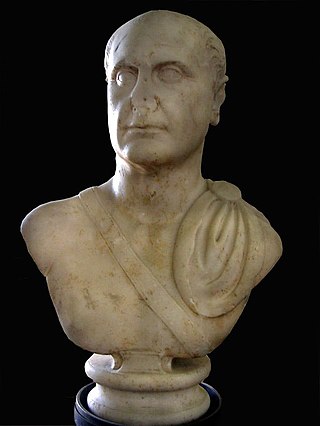Related Research Articles
The gens Acilia was a plebeian family at ancient Rome, that flourished from the middle of the third century BC until at least the fifth century AD, a period of seven hundred years. The first of the gens to achieve prominence was Gaius Acilius, who was quaestor in 203 and tribune of the plebs in 197 BC.
Quintus Pompeius Falco was a Roman senator and general of the early 2nd century AD. He was governor of several provinces, most notably Roman Britain, where he hosted a visit to the province by the Emperor Hadrian in the last year. Falco achieved the rank of suffect consul for the nundinium of September to December 108 with Marcus Titius Lustricus Bruttianus as his colleague.

Lucius Julius Ursus Servianus was an Iberian Roman politician. He was a prominent public figure in the reigns of Roman emperors Nerva, Trajan and Hadrian. He was the last private citizen to receive a third consulship; such honors came to be reserved for members of the emperor's family.
The gens Calvisia was an ancient Roman family, which first rose to prominence during the final decades of the Republic, and became influential in imperial times. The first of the gens to obtain the consulship was Gaius Calvisius Sabinus in 39 BC.
Gaius Salvius Liberalis Nonius Bassus was a Roman senator and general, who held civil office in Britain and was a member of the Arval Brethren. He was suffect consul in the last nundinium of 85, with Cornelius Orestes as his colleague.

The gens Pomponia was a plebeian family at ancient Rome. Its members appear throughout the history of the Roman Republic, and into imperial times. The first of the gens to achieve prominence was Marcus Pomponius, tribune of the plebs in 449 BC; the first who obtained the consulship was Manius Pomponius Matho in 233 BC.

Lucius Funisulanus Vettonianus was a Roman general and senator during the reigns of the Flavian emperors. He was suffect consul in the nundinium of September to October 78 with Quintus Corellius Rufus as his colleague.
The gens Novia was a minor plebeian family at ancient Rome. Members of this gens first appear during the final century of the Republic, but the first of the Novii to obtain the consulship was Decimus Junius Novius Priscus in AD 78.
Tiberius Julius Candidus Marius Celsus was a Roman senator who lived during the Flavian dynasty. Contemporary sources, such as the Fasti Ostienses, the Acta Arvalia and a letter of Pliny the Younger, refer to him as Tiberius Julius Candidus. He was twice consul.
Marcus Cornelius Nigrinus Curiatius Maternus was a Roman senator and general during the reign of Domitian. He was suffect consul during the nundinium of September to October AD 83 with Lucius Calventius Sextus Carminius Vetus. Although some experts consider him a rival with Trajan as heir apparent to the emperor Nerva, he is primarily known from inscriptions.
Lucius Venuleius Montanus Apronianus was a Roman senator of the first century. He was suffect consul for the nundinium of January to April AD 92 with Qunintus Volusius Saturninus, replacing the emperor Domitian.
Lucius Neratius Priscus was a Roman Senator and leading jurist, serving for a time as the head of the Proculeian school. He was suffect consul in the nundinium of May–June 97 as the colleague of Marcus Annius Verus.
Sextus Subrius Dexter Cornelius Priscus was a Roman senator who held several imperial appointments during the reign of Trajan. He is best known for being an acquaintance of Pliny the Younger. Around the year 104 Cornelius Priscus was suffect consul for an as yet undetermined nundinium.
(Lucius?) Plotius Pegasus was a Roman senator and jurisconsult active under the Flavian dynasty. He was suffect consul in an uncertain year, most likely 72 or 73, as the colleague of Lucius Cornelius Pusio Annius Messalla. Shortly after his ascension to the imperial throne, Domitian appointed Pegasus urban prefect, one of the most prestigious offices in a senatorial career.
Gaius Vibius Rufus was a Roman senator and orator, who flourished during the Principate. He was suffect consul in the second half of AD 16 with Gaius Pomponius Graecinus as his colleague. The first of his family to achieve consular rank, Rufus was a homo novus, one of ten in the first five years of the reign of Tiberius.
The gens Raecia, also spelled Racia, was a minor plebeian family at ancient Rome. Members of this gens are first mentioned at the time of the Second Punic War. Marcus Raecius was praetor in 170 BC. However, after this the family fell into obscurity until imperial times.
Acilius Rufus is the name of a Roman senator, who was suffect consul in the nundinium of March to April 107; it unclear which consul ordinarius of the year Rufus replaced, Lucius Licinius Sura or Quintus Sosius Senecio. The expert consensus agrees that Rufus should be identified with the Acilius Rufus whom Pliny the Younger mentions in his letters on the trial of Varenus Rufus who was prosecuted for malfeasance while governor of Bithynia and Pontus.
References
- ↑ Paul Gallivan, "The Fasti for A. D. 70-96", Classical Quarterly , 31 (1981), pp. 191, 217
- ↑ CIL XVI, 35
- ↑ Epistulae IV.5; VIII.3
- ↑ Martial, XII.57
- ↑ Syme, "Pliny the Procurator", Harvard Studies in Classical Philology, 73 (1969), pp. 231f
- ↑ Pitcher, "A Prosopographical Note on Martial XII 57", Mnemosyne, Fourth Series, 37 (1984), pp. 454-457
- ↑ Christol, "A Propos d'inscriptions latines d'Uthina (Oudhna, Tunisie)", Zeitschrift für Papyrologie und Epigraphik , 178 (2011), pp. 285-299
- ↑ Eck, Werner; Holder, Paul; Pangerl, Andreas (2010). "A Diploma for the Army of Britain in 132 and Hadrian's Return to the East". Zeitschrift für Papyrologie und Epigraphik. 174 (2010): 193.